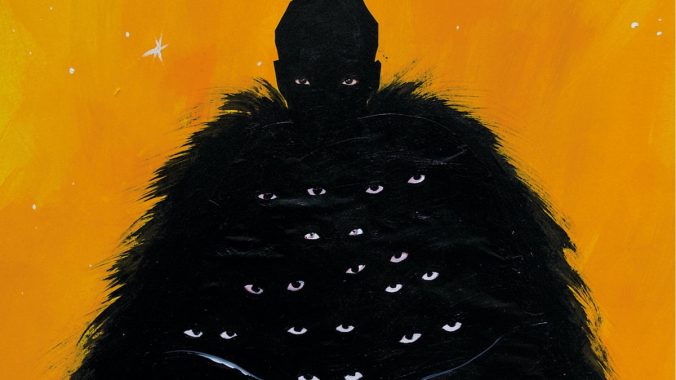Album of the Week | Anjimile: The King
With a return primed for coronation, the Durham-based folk singer radically upends his sound to craft a grand portrait of fiery rage and tender self-mythologizing

The strange thing about mythology is that it only works as far as you’ve been given a chance to fit into it. Trying to place yourself inside the larger-than-life lineage of a culture becomes increasingly fraught if that culture hasn’t considered you in its acts of myth-making, carving you and your story out of the picture for a picaresque narrative that sugarcoats its own bloody reality. In these instances, the only viable action is to write about and into the blank spaces as boldly as you can, with the intent of finally being heard. Folk artist Anjimile Chithambo does just that on his thundering second record The King, quite literally beginning with a retelling of the Biblical story of Belshazzar’s feast, as a direct means of stating his aims. “There’s a king on high,” Anjimile sings of this tale, and—as in the Book of Daniel—that long, dishonorable rule from those who previously commanded the narrative must be overthrown.
Where his debut album Giver Taker explored a more delicate form of personal storytelling—often delivered via nimble, unadorned acoustic guitar flourishes in line with Sufjan Stevens’ Michigan or Illinois—Anjimile works on a much grander scale across The King, as if conjuring a vision of what folk music would sound like if it was delivered by Philip Glass. It’s a record akin to speaking with the force of every voice like Anjimile’s that has been left silent for centuries, arriving with a volume and might that feels primed to shatter anything that gets in its way. Guitar strings now thrum and buzz where they once felt gentle, and Anjimile’s voice is occasionally put through bass-heavy filters or joined by a calamitous, otherworldly choir sonorous enough to make the speakers rattle.
Anjimile’s choice to radically reconfigure the basics of his sound is nothing short of revelatory. Much of The King comes solely from Anjimile’s guitar and voice, even if the record’s production makes it sound as if the tracks are being wrought by a cataclysmic full band. On the climax of “Mother,” Anjimile twists their guitar into a wounded howl of a thing, like a klaxon cry at the climax of a Godspeed You! Black Emperor piece. The pure range of sounds that Anjimile and producer Shawn Everett are able to invoke calls to mind the work BJ Burton made with Low on their final albums, reenvisioning the simplest instrumentation possible until it sounded anything but its source. Here, his acoustic guitar takes on a similarly striking effect: harnessing all the tenderness commonly associated with it on tracks like “Father,” before being torn apart in a distortion-heavy flurry and redirected as a sharp percussive implement on “Black Hole.”
-

-

-

-

-

-

-

-

-

-

-

-

-

-

-

-

-

-

-

-

-

-

-

-

-

-

-

-

-

-

-

-

-

-

-

-

-

-

-

-








































